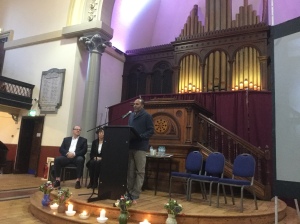In preparation for a three minute talk I gave today at a memorial event for Robin Murray, convened by his family, I have looked through email exchanges with myself, Pat Conaty, Laurie Gregory and colleagues in the co-operative sector, in his role as a very distinguished Associate of Co-operatives UK. There is so much more value of course than I did justice to on my feet, so here are some (edited, note) sayings of Robin over time that I draw out that strike me as timely and profound.
1. Sharing
At the heart of cooperation is sharing. If your identity is about possession, about having, sharing is a threat. If you are open to a wider sense of identity and value, that comes from sharing and collective being, it is an affirmation. Hence the great importance of the experience of cooperation, of festivals and dance, or common meals, of working together on a common task.
2. Prisoner’s Dilemma
I spent today being shown around Crumlin Gaol, by one of the people who’d been interned there, talking social innovation, peace and reconciliation. Talk about cooperation! The Prisoner’s Dilemma which is all about individualism is in some ways the opposite of what seems to characterise life there.
3. Democracy
I am struck by the emphasis needed on the spirit and temper of democrats rather than the pre-occupation with institutional structures. Democrats are not defined by institutions but by their relationships and being. Democracy depends on democrats just as cooperation depends on cooperators.
4. Capital
The story of King Midas, and later versions (such as Volpone – “good morrow to the world. And next my gold. Open the shrine so I may see my saint”) are reactions to the expansion of commodity relations and the first transformation of money into capital. I’ve always felt uneasy about using the terms human capital, social capital and so on because it obscures the fact that money capital is ‘self-expanding value’ – it’s only raison d’etre is to expand. Human, social and indeed natural capital do not have this same impulsion. We risk losing ourselves in the infinity of monetary expansion to the exclusion of all else.
5. Against the normal
Many of the most successful social ventures are centred on propositions that invert the norm. Slow food as against fast food. Peer lending between those without assets. Jaime Lerner’s Curitiba that paid for your waste rather than taxed you for collecting it. Care co-operatives that are about relationships rather than customer services.
6. Four types of co-operative
We can perhaps make a distinction of four types of co-operatives:
– those formed to counter a market monopoly (e.g. consumer coops against wholesalers or monopoly retailers)
– those formed to undercut a structural monopoly (e.g. Community Land Trusts over land, or worker co-operatives over capital)
– those formed to realise the productive economies of co-operation, through specialisation, sharing of indivisible equipment or land, or knowledge and information
– those formed to create an alternative economy centred around some concept of the good life.
They are not exclusive, but they may involve different kinds of governance and forms of cooperation. And they may have different trajectories (with the fourth commonly dissolving into one or more of the others)
7. Market power
It is striking how many sectors of the economy are dominated by a few large firms. Here is the bind. We depend on these companies yet they abuse their position.
8. Long waves of cooperation
The Rochdale Pioneers came out of a counter movement in the 1840s. There was a surge of cooperation in the 1880s and 1890s in Europe in the wake of the long depression and of rural electricity coops in the US in the depression of the 1930s. Standing back, we see that just as there have been long waves of economic prosperity, so there have been long waves of cooperation.
9. Cooperatives and the state
Early co-operatives in the nineteenth century developed separately from the state, and often in conflict with it. It was a social economic movement to provide basic needs for urban workers, rural communities and small farmers, based on mutuality and self-help. By the late C19 it had become what Lord Rosebury called ‘a state within a state’, jealous of its autonomy. But from 1945 onwards, it was undercut in many spheres by the expansion of the welfare state. Education, health, social insurance, housing, libraries, many leisure services became services provided by the state not by self-help. Slow to innovate, the UK cooperative movement entered fifty years of economic retrenchment. Now perhaps we are entering a third phase. Now we have a retrenchment of the state and a resurgence of the cooperative and social economy movement. One key innovation may be a model of public social partnership, which marries the advantage of cooperative, self-managed decentralisation with the public ‘systemation’ that provides coherence to the complex and diverse ecology of a digital age.
10. Automation
Automation is coming but it does not dissolve the challenge of economic production. It does not solve the social design of technology and its control. It does not replace the growing need for relational services and human experiences. It does not solve the quest for the life affirming character of meaningful work. Attempting to build an alternative economics or politics without a connection to the practice of production, including virtual production of course, is like building it on sand.


Democracy depends on democrats just as cooperation depends on cooperators.
Sad to have missed what will have been as amazing event to celebrate Robin’s contribution to our movement.
This is really valuable Ed; thank you very much. I particularly like the “four kinds of cooperative” categorisation.
Gavin